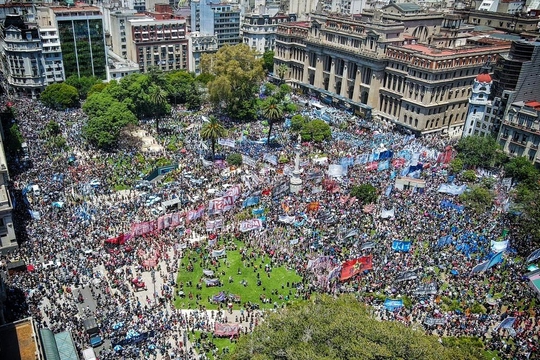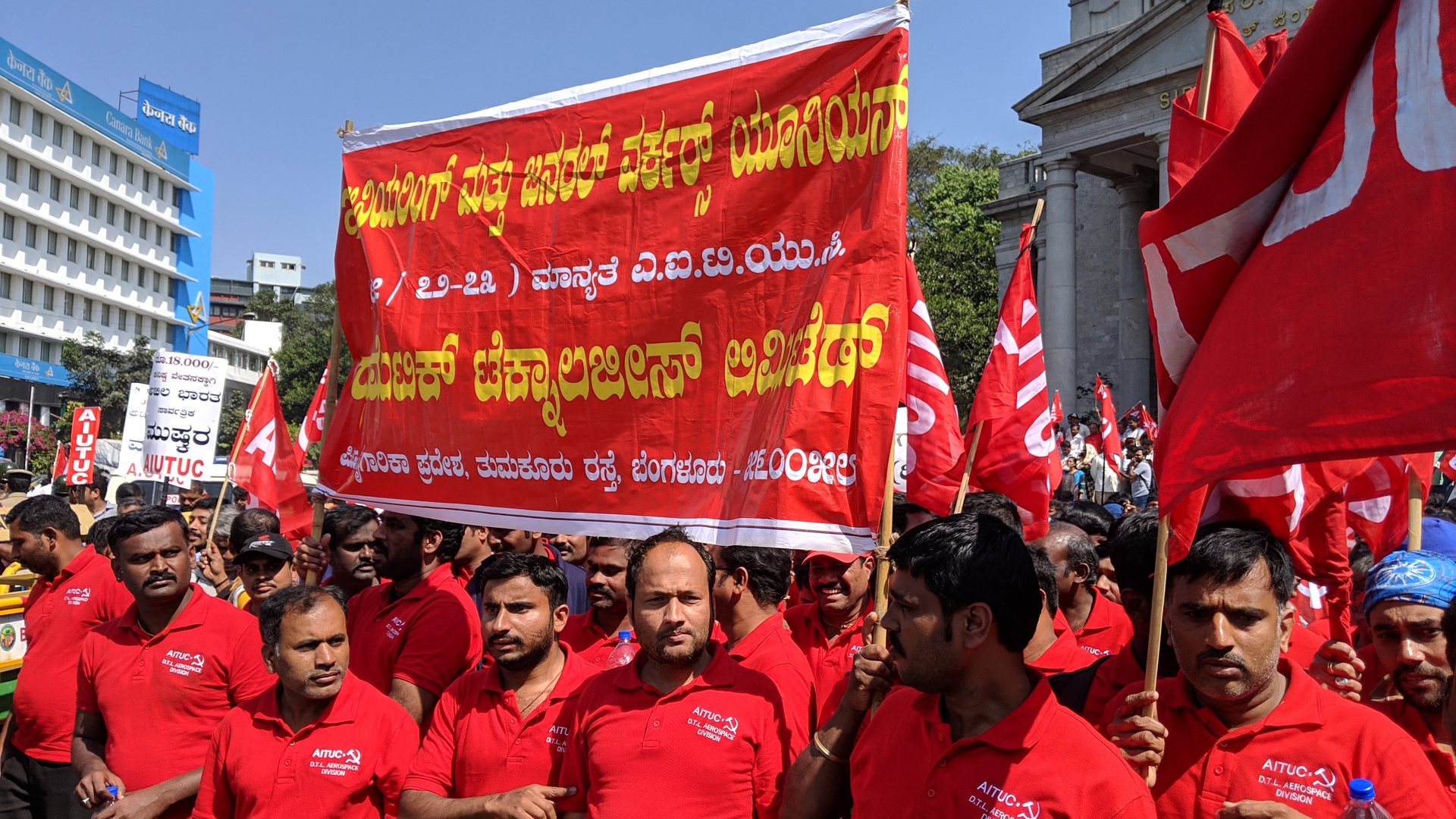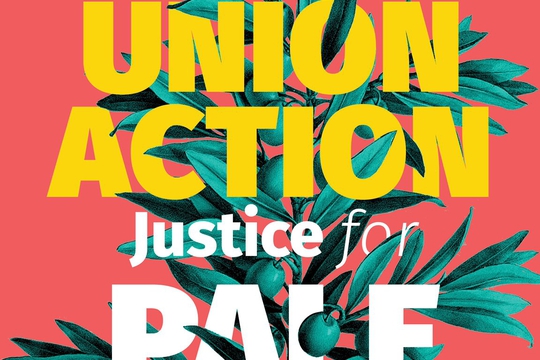The General Strike Against Milei
by
Clara Marticorena,
Julia Soul
February 7, 2024
The election of the self-described anarcho-capitalist has provoked a new wave of struggle

inquiry
The General Strike Against Milei
by
Clara Marticorena,
Julia Soul
/
Feb. 7, 2024
The election of the self-described anarcho-capitalist has provoked a new wave of struggle
Following the election of self-described anarcho-capitalist president Javier Milei on the 22nd of November, the situation in Argentina has become very tense. Milei became popular as a panellist on a TV show and built his popularity by rejecting the traditional parties and promising the dollarisation of the economy as the recipe to solve people’s economic problems. He was elected with the support of the right-wing coalitions and won the votes of a heterogeneous section of society, people from the working class disgruntled with the Peronist Party, but also people from the middle and ruling classes opposed to state intervention in the economy and income distribution. His program, consisting of dollarisation, deregulation of the economy, privatisation and the idea of ending the “privileges” of the undefined “casta” [caste], has already provoked an intense social struggle, since the casta seems to be made up of the working class and the poorest, and the privileges are in fact nothing but labour and social rights.
On the 24th of January more than 1.5 million people took part in a General Strike and in the demonstrations held in the main cities of Argentina. It was the first time that such a mobilisation took place just 45 days since the new government came into office. The 24 Enero [January] general strike garnered national and meaningful international support: solidarity statements were sent from the main global unions and confederations, and demonstrations were held in Spain, France, Brazil, Uruguay, and Mexico, among others. The strike was organised by a broad array of organisations and groups. Feminist groups, human rights organisations, cultural workers, tenants’ unions, and political parties (from the left grouped in the Left Workers Front FIT-U, to factions of traditional Peronist and Radical parties) joined the labour confederations (General Labour Confederation, CGT, and both factions of the Argentinian Labour Central, CTA- A and CTA-T), and the Popular Economy and “piquetero” movement to show massive rejection of the Decree and the Law the government intends to pass. Amongst the participants were the Madres de Plaza de Mayo, an organisation created during the last dictatorship (1976-83) to represent the mothers of people disappeared by the Junta Militar. Their presence on the stage in Buenos Aires alongside the general secretaries of the Truckers and Health Workers’ Unions raised the popular demands of Memory, Truth and Justice, in the face of a government whose main figures have repeatedly supported the dictatorship.1
The broad coalition that organised the strike is responding to the offensive launched by Javier Milei’s far-right government over popular living conditions, and social, labour, feminist, and environmental rights. The new government intends to implement labour and pension systems ‘reforms’, deregulate economic activity, privatise public companies, and shrink the state through massive redundancies, the closure of essential ministries and public organisations and brutal austerity in areas such as culture, education, health, science, and social policies.They argue that this is necessary to control inflation and reduce the fiscal deficit, thereby meeting the goals set by the International Monetary Fund.
In sum, this far-right government aims not only to implement austerity and a macroeconomic stabilisation on the capitalists’ terms but also for a complete socio-economic national restructuring by implementing an economic ultra-liberal, and politically conservative, authoritarian program. Their program systematically favours capital, and seeks to strike a hard blow on the working people whilst shifting the balance of social power in favour of the big capitalist firms. These measures would produce a brutal transfer of income upwards and the deepening of an extractivist economic matrix. This can only be achieved by disciplining and punishing working people through authoritarian policies and by eliminating the rights historically won by the labour movement, the feminist movement, human rights organisations and other groups.
Economic restructuring and repression: the government launched a war against the working class
As soon as it took office, the government imposed a 118% devaluation of the Argentine Peso and the deregulation of all prices. This dealt a heavy blow to the pockets of workers, pensioners, and the middle class. These initial decisions spurred inflationary dynamics (the monthly inflation rate reached 25% in December and is likely to remain at this level in the coming months) and a catastrophic fall in popular real incomes. Public workers’ wages, pensions, and social programs were frozen, and wage increases achieved by collective bargaining were liquidated (except for a few sectors that had negotiated indexation clauses.)
In the meantime, the government seeks to achieve the goal of economic-political re-foundation. On one side, they tried to pass a “necessity and urgency” Decree - a particular legal tool that limits the possibility for legislative debate in parliament (where Milei does not have a majority).The Decree included legal modifications to laws and regulations that directly impact on living costs, such as those that establish rental, food prices, oil, medicines, or public service regulations. On the other side, they sent to Congress an Omnibus law project, entitled “Bases y Puntos de Partida para la Libertad de los Argentinos” [Basis and starting points for Argentinean freedom].
In its original version, the bill presented on 27 December constitutes an ambitious project that includes 664 articles with amendments on a wide variety of economic, political, and social aspects, among which the following stand out: the delegation of extraordinary powers to the President of the Nation for a term that may be extended up to 4 years, electoral reform, strong restrictions and penalisation of the right of assembly and demonstration, the suspension of pension’s mobility, tax changes for the benefit of capital and the privatisation of a total of 41 public companies (or companies with state shares), such as the oil company (YPF S.A.), the national public bank (Banco Nación), public media, among many others.
Both the Necessity and Urgency Decree and the Omnibus bill contain regulations which, if approved, represent a far-reaching labour reform, with advances on individual and collective labour rights. On the one hand, informal employment is promoted, dismissals are facilitated, probation periods are extended and working hours are made more flexible. On the other hand, the right to strike and union activity in the workplace are limited, individual bargaining is promoted to the detriment of collective bargaining, and the union’s financial resources are cut.
As regards the repressive advance, the law seeks to deepen the repressive policies: the right of assembly and demonstration on public roads is notoriously limited, “unauthorised” meetings are penalised and different forms of collective action are criminalised. The government’s repressive strategy had already had a first advance with the so-called “anti-picketing protocol” presented by the Ministry of Security a few days before the 20 December demonstration, which has so far failed due to the mobilisation in the streets. (As of the 7th of Feburary, the passage of this law has been paused in the face of massive poopular resistance - Ed)
The Popular Reaction
The popular response to this all-out assault was not long in coming. First of all, the demonstration in Plaza de Mayo to commemorate the anniversary of the “Argentinazo” - the popular uprising that threw out the neoliberal conservative government of Fernando de la Rúa in December 2001 - was not cancelled, defying the instructions of the Minister of Security. The successful mobilisation in the afternoon, called by leftist parties, human rights organisations, and social movements, empowered people, so after Milei made the announcement of the Decree on a nationwide broadcast, spontaneous cacerolazos (demonstrations featuring the banging of pots, and pans) were heard all over the city of Buenos Aires and in some of the suburban localities, as a sign of protest against the announced measures.
That night, people from different neighbourhoods marched to the National Congress, staging the first cacerolazo against the government just 10 days after Milei took office. The cacerolazos and neighbourhood assemblies were repeated in the following days and spread to different cities. These expressions of popular discontent, together with the government’s refusal to negotiate the content of the “labour reform”, prompted the CGT to call a mobilisation to the Argentina’s highest court. Thus, on 27 December, the Confederation, backed by a massive and multisectoral demonstration, filed an appeal for protection (recurso de amparo) against Milei’s DNU.
The filing of appeals for legal protection by different social organisations affected by the DNU has multiplied, with mixed results. Particularly, those referring to the “Labor Reform” were legally accepted and its application has been suspended. Thus, the cacerolazos, neighbourhood assemblies, multi-sectoral calls, and generalised discontent paved the way for the call for a general strike and mobilisation on 24 January by the CGT.
“El 24E ya es de todos” (The 24 January belongs to everyone)
The 24E had new features compared to the previous general strikes. These novelties reflect the political and economic conjuncture, as well as the changes in the composition of the forces in struggle. The most striking feature is the call for a general strike only 45 days after the new government took office. In fact, the last general strike called by the CGT was in 2019, despite the adverse conditions suffered by the working class during and after the pandemic. The leadership of the CGT, which is characterised by its preference for social dialogue with the government and employers, is thus showing a change of strategy in the context of a strong offensive by capital and in the face of a government that is unwilling to negotiate.
The role of the CGT as coordinator of mass and multisectoral mobilisations is another peculiarity of the 24E. This role had already been played in the mobilisation in front of the courts on 27 December, when the other trade union confederations and numerous social and political organisations joined the action. All these mobilised sectors found a common point to support the strike on 24 January. “24E already belongs to everyone,” declared the CGT in its networks and media publications.
In addition to the classic bloc of working class trade unionism, organisations of the popular economy, cultural associations, tenants, neighbourhood assemblies, and feminists, among others, joined the strike, which became a multisectoral protest to express the rejection of the DNU and the “Omnibus Law”. This diversity reflects the heterogeneity within the working class and the partial nature of the representation of the CGT, because of the significant weight of informal labour, which reaches almost 50% of the employed workers - including unregistered salaried workers, self-employed workers, and cooperative workers of the popular economy. These are structural changes in the working class, rooted in the capitalist restructuring that took place during the 1990s, which also modified the forms of organisation and the dynamics of collective action. On one side, CGT represents formal workers in the private sector, and CTA-A and CTA-T represent workers in the public sector, with permanent or precarious contracts. Trade union density in Argentina is relatively high by international standards, at 37% in the private sector and 46% in the public sector. On the other side, social movements and popular economy organisations represent informal and unemployed sectors of the working class, who depend for their subsistence on social assistance.
For this reason, the inclusion of social movements and workers in the popular economy significantly increased the representativeness of the protest. Also, the recognition of the “cultural sectors” and other social organisations was a response to the comprehensive nature of the ultra liberal offensive, which affects not only labour relations but also social reproduction (public services, health, education, etc.).
Third, despite the repressive attempts of the government to intimidate and criminalise the protest, it is important to highlight the participation of a significant number of self-organised people or new organisations such as the neighbourhood assemblies, bringing back the organising experiences of the 2001 crisis.
Challenges and prospects: what after 24E?
The popular assessment of the strike and the mobilisation is generally positive. In terms of immediate effects, the postponement of the legislative debate on the bill and the elimination by the government of some of the contents demanded by a section of the opposition willing to guarantee national stability stand out. At the same time, the labour reform contained in the DNU was declared unconstitutional by the labour courts.
The struggle could go either way. Its development will depend on the strength and coordination that the working class and popular sectors can achieve, given the necessity of multisectoral and massive campaigns to confront the government’s plans. In this respect, 24E leaves several questions open: To what extent are the CGT leaders willing to assume an articulating role in social protest? How far will the mobilised and self-organised sectors be able to maintain pressure on the trade union centres to continue mobilisation? More importantly, what are the prospects for a radicalisation of the resistance to the attempt at ultra-liberal refoundation? To what extent do the current conditions open up a space for the growth and accumulation of militant and left currents with a presence in the trade union movement and in the mobilised sectors?
-
Organisations created by unemployed people that, with the social assistance they receive from the government, build collective and community projects such as bakeries, brickyards, canteens, school assistance, etc. In the last years, “Popular Economy” became a political category to claim for rights as “workers” - neither as “unemployed” nor as “informal”. There are different organisations, like Worker’s Pole (Polo Obrero), Popular Front Darío Santillán (Frente Popular Darío Santillán), and the Workers Union of Popular Economy (Unión de Trabajadores y Trabajadoras de la Economía Popular - UTEP), among others. ↩
Subscribe to Notes from Below
Subscribe now to Notes from Below, and get our print issues sent to your front door three times a year. For every subscriber, we’re also able to print a load of free copies to hand out in workplaces, neighbourhoods, prisons and picket lines. Can you subscribe now and support us in spreading Marxist ideas in the workplace?
Read next


